Aeonium kiwi’s are such great looking succulents which usually grow faster and easily. Aeonium kiwi succulent is a unique succulent when compared with other succulents since they prefer to have more water than others.
It is a hybrid version of Aeonium haworthii. Some people even call it the Aeonium haworthii tricolor.
They are hailing from the Canary Islands. Aeonium kiwi succulent is becoming a trendy and a quite famous plant among botanists, gardeners due to the amazing tri color leaves they have.
Once you expose these plants for adequate sunlight, chances are that these leaves would turn yellow first and become dark green in color later.
Further their leaf tips would also become pink or red in color. You could expect them to flower with large yellow blooms during late summer on and off.
Further, Aeonium kiwi succulents are monocarpic plants which means the plants would perish once they complete flowering.
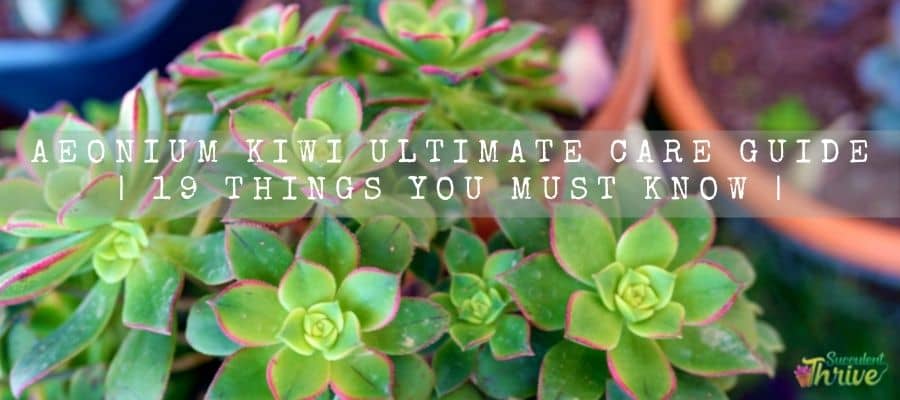
How do I identify an Aeonium kiwi?
Aeonium kiwi succulent is easy to identify since they are a tri color succulent. They produce leaves which come up in rosettes.
These plants have inherited the tri color mainly due to the colors in the leaves. Those leaves are almost green in color.
They usually have a yellow touch at the center of the leaves. Once you expose them for direct sunlight, chances are that they would get red or pink leaf tips.
However, you need to expose these plants to direct sunlight for a maximum of two hours daily only.
How do you take care of an Aeonium kiwi?
Aeonium kiwi succulents are somewhat different to other succulents as aforesaid. They are in fact going into dormancy during summer.
Their new growth would take place during the winter season when the conditions are favorable for them.
They could stay alive outdoors during the summer season when conditions are not too harsh. Unless you should consider growing them indoors during summer.
However, chances are that they could skip their dormancy and continue to be growing right throughout.
Aeonium kiwi succulents would require only a little maintenance from you. With that being said, it is important that you continue doing the regular pruning so that you could keep the foliage look attractive and denser.
How Tall they grow?
Usually, these plants would tend to grow as shrubs and each of them would be about 2-3 feet in height.
Growth Rate of the plant
Aeonium kiwi succulents tend to grow in sub shrubs which literally mean they would produce woody growth particularly closer to the base of the plant and tend to stay short.
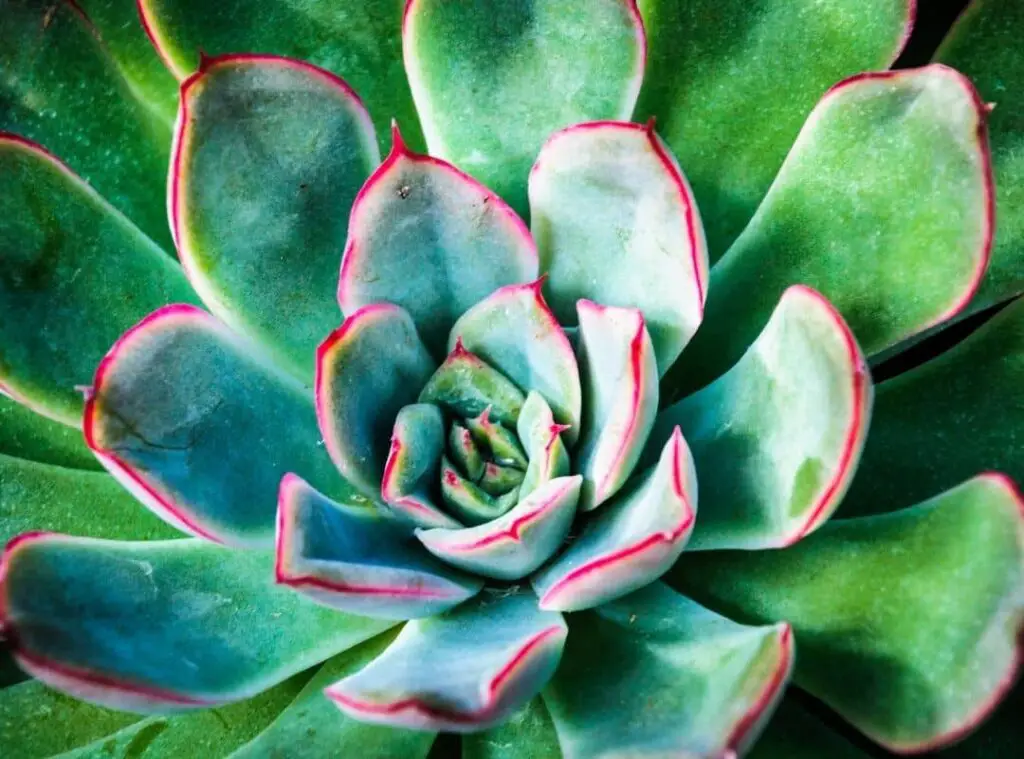
How much Light do they need?
Aeonium kiwi succulents are fond of sunlight which is an obvious fact since they are a succulent type. Level of sunlight is what mainly affects the coloring of the plant.
However, these plants would easily burn if you expose them to intense sunlight for some time.
On the other hand there are some succulents which could thrive in direct light for some time. For example, if we take a Kalanchoe,
they will grow well if they get direct sunlight for the whole day. However, Aeonium kiwi succulent would want direct sunlight just for two hours a day.
They could even thrive in locations where they do not get direct sunlight at all. Having said that, chances are that the less exposure to sunlight would cause them to lose the vivid color of the plant. Alternatively, you may also consider using grow lights so that you could supplement light.
You could expect the Aeonium kiwi succulents leaves to look a little curled particularly during the hot summer season.
They usually do this as a way of reducing the exposed leaf surface to the sunlight. Consequently, it would help to halt the loss of water due to evaporation.
This is not something which would affect the health problems of the plant but if you wish not to have it on your beloved plant, you should consider shifting the plant indoors so that it could protect the plants from such situations.
Temperature and humidity
Aeonium kiwi succulents would want to have cooler and wetter climates to thrive well. Best temperature to grow these plants would be 65- 75 degrees Fahrenheit (18- 24 degrees Celsius).
They could withstand the mild frost conditions since they are cold hardy. Further avoid exposing the Aeonium kiwi succulents for humid rooms since that could lead to root rot which could be deadly.
If you wish to speed up the air circulation, you could consider placing fans close to the plant.
Is it cold hardy?
Aeonium kiwi succulents are somewhat cold hardy to some extent.
Zone
Aeonium kiwi succulents would prefer to grow in Zone 10a (Minimum 30° F | -1.1° C)
Watering Requirement
As we explained from the beginning of the article, Aeonium kiwi succulents are different from other fellow succulents. For example, They would want a little more moisture than the rest of other succulents to thrive well.
Having said that, if you want to know whether you need to water these plants or not, best to conduct a finger test and decide whether it is the right time to water them.
To do that, you could simply place the finger about 2 inches in depth of the soil and check whether it is too dry. You can water them once every week which is more similar to the watering pattern of the other succulents.
When watering these succulents during their actively growing seasons( winter to spring,) you could speed up watering them.
Literally you may water them thoroughly whilst doing it more often. When watering them during summer which is their dormant season, best is to first see whether the succulent leaves are wrinkled and only then water. Usually, we do not water during their dormancy.
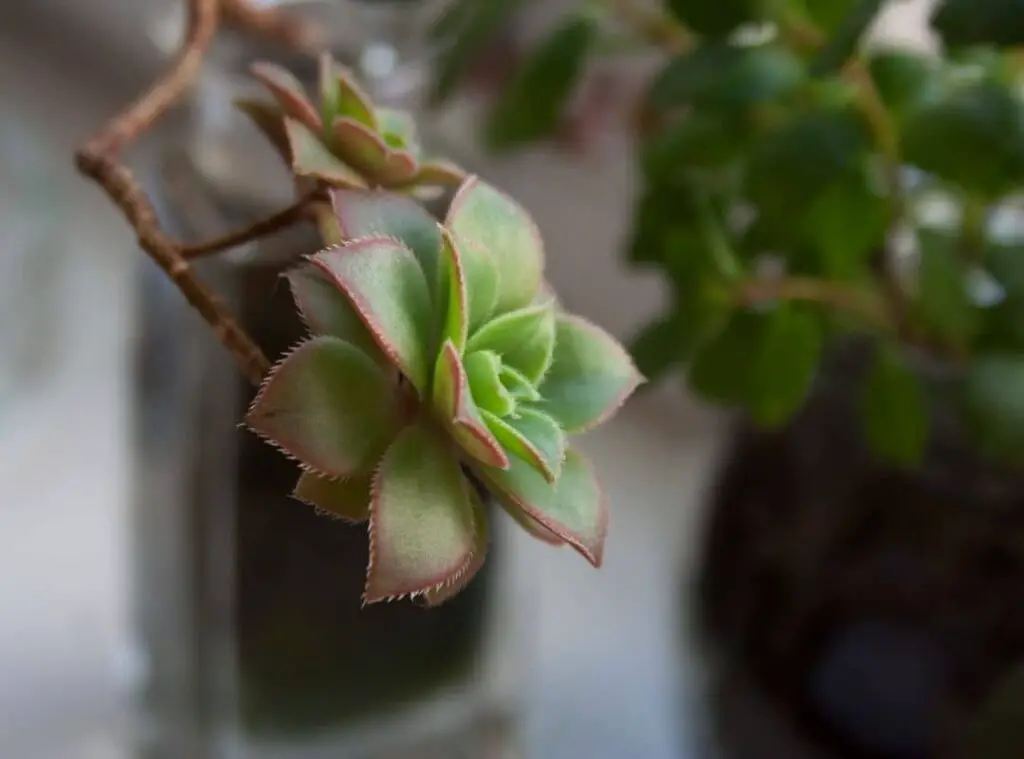
Soil Requirement Type / pH
You need to grow these plants in a well-draining soil mix. The ideal ph should be 6.1- 7.5. I am sure you know that it is vital to have a well-draining soil mix for any type of succulent to grow well.
Aeonium kiwi succulents are no different. So, you cannot use regular potting soil to grow these plants. Alternatively, you may also go ahead with succulent and cactus soil mix as well.
Even though Aeonium kiwi succulents can stay healthy in a little moist, it is crucial that you are growing them in a well-draining soil mix.
On the other hand, make sure your pot also carries sufficient draining holes as well. Unless, you will have to encounter repercussions such as root rots.
Where to Plant?
Aeonium kiwi succulents cannot withstand the colder weather conditions for long time. Therefore, if you live in a place where the temperature drops to 30 degrees Fahrenheit ( -1.1 degrees Celsius).
I recommend growing the plants in a container which you could bring indoors. Aeonium kiwi succulents would perform well in full sunlight to partial sunlight.
If you wish to grow them outdoors, you could place them somewhere where they get at least 2 hours of direct sunlight.
For the rest, they would thrive in partial sunlight. In case if you are growing them indoors, you could place them near a brightest sunny window.
Fertilizer and time of year
Aeonium kiwi succulents are not dependent on too much fertilizers. Having said that you could consider feeding them lightly with a balanced liquid fertilizer at a hard strength.
Best recommended is to feed them once every month during their growing season. You may skip feeding them when they go into dormancy.
Dormancy
Aeonium kiwi succulents are summer dormant plants.
Flowering
Usually Aeonium kiwi succulents ‘ flowering would take place after so many years. You could expect them to bloom in summer.
Those flowers have a stunning yellow shade. As briefly explained in the beginning of the article, these are monocarpic plants.
That means these plants could perish once they flower. As such I would recommend you to propagate them before this takes place.
Can it be toxic to pets?
Aeonium kiwi succulents are nontoxic for domestic pets.
Handling the plant
Aeonium kiwi succulents are easy to care for plants and you only need to make sure that you are fulfilling its basic growing requirements.
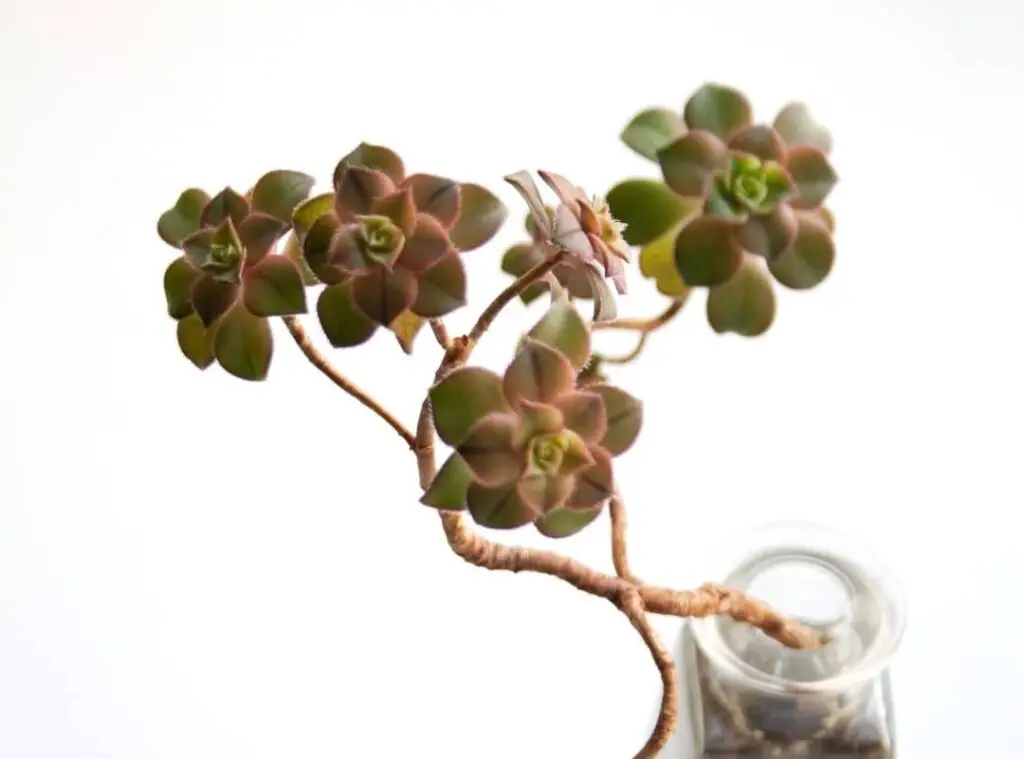
Are they Indoor plants or not
Aeonium kiwi succulents would thrive well be it indoors or outdoors. You could consider adding them to your rock gardens as well as for the Mediterranean garden.
If you wish to grow it as an indoor plant, maybe you could add other succulents and try making a tiny garden. In addition to that, you could grow them in small pots as well.
They would bring a refreshing vibe to the entire area once you grow them.
Common bugs and illness issues
When it comes to common bugs and to illness issues of these plants, over watering could be the main root cause which could cause many of these issues.
In addition to that, issues with sun exposure, wrong soil mix would also contribute to such conditions.
Usually during summer dormancy, they would not grow as much as they do in their growing seasons. That is very natural, and you could ignore this condition. However, they would come across the following diseases.
Root rot – This is a common disease which takes place due to over watering. It could have severe repercussions on the plant which could be even fatal.
However, there will be early indications such as soggy leaves, soggy stems, yellowing, wilting and black roots once the plant is suffering from root rots.
Apart from that, chances are that your kiwi plants will have to encounter pests such as mealybugs and aphids.
So, it is always best to keep these plants under your observation so that you could see any signs of infections. Once you identify these issues, it would be better if you could attend to these issues then and there.
Repotting
In terms of repotting the Aeonium kiwi succulents, it would be better if you could do it once every few years.
You may do it at the end of summer. It would be always better to provide new growing conditions for them to grow well once they reach the growing season.
When selecting a pot, you need to always go for a slightly larger pot so that the roots could grow well in the new pot. Once you repot, you could continue watering them like you used to do before.
Special Care tips
As aforesaid, you need to provide its basic growing requirements and they would reward you with a fantastic plant in return. In addition to that you could repot them when you think it is necessary to do so.
Aeonium kiwi plant benefits
Aeonium kiwi succulents would be handy in using for succulent gardens or for rock gardens. Apart from that you could consider growing them in containers as well.
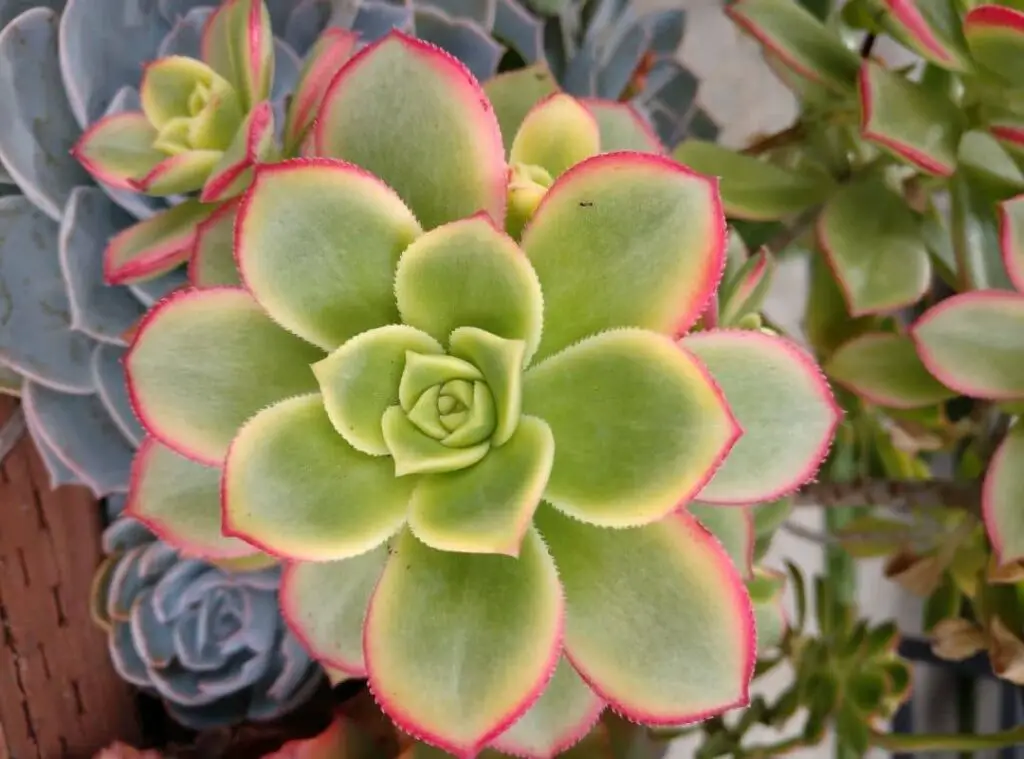
On look care guide
| Botanical Name | Aeonium Haworthii |
| Common Name | Decorum Kiwi, Dream Color, Tricolor |
| Plant Type | Succulent |
| Mature Size | 2-3 feet |
| Sun Exposure | Full sunlight to partial sunlight |
| Soil Type | Well-draining |
| Soil pH | 6.1- 7.5 |
| Bloom Time | Summer |
| Flower Color | Yellow |
| Hardiness Zones | Zone 10a |
| Native Area | Canary Islands |
| Toxicity | Non toxic |
Average price – 12 USD
Read Next: Pencil Cactus Fertilizer | 11 Most Requested Topics |
